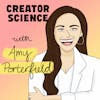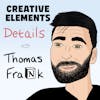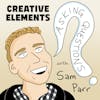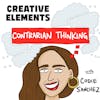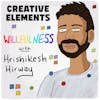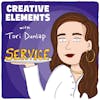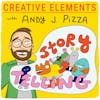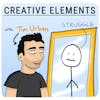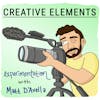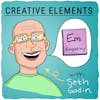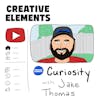
Jake Thomas is the writer of Creator Hooks, a newsletter dedicated to helping you write better YouTube titles by studying human psychology.
WATCH
▶️ Watch this episode on YouTube
***
EPISODE DESCRIPTION
Jake Thomas is the writer of Creator Hooks. Creator Hooks is a newsletter dedicated to helping you write better YouTube titles by studying human psychology.
I read this newsletter every week, and what I love about Jake’s approach is that he’s very data-driven.
In this episode, you’ll learn how to research your own titles, how you can leverage human psychology to get views, some successful frameworks for titles, and why curiosity is the most impactful emotion to tap into.
Full transcript and show notes
Follow Jake Thomas on Twitter
TIMESTAMPS
00:00 - He Is The Biggest YouTube Title Nerd IN THE WORLD
01:20 - DON’T Copy The Biggest YouTubers. Here’s Why
05:13 - How Jake Became OBSESSED With YouTube Titles
08:05 - The SECRET to Finding Patterns In Successful Titles
10:33 - The 3 Clickworthy Emotions You Don’t Know About
14:36 - How A Pro YouTuber ACTUALLY Makes Titles
19:09 - Playing The CRINGEY Game Of YouTube Titles
23:26 - Become A PRO At YouTube Titles
29:25 - Titles Are More Important Than Thumbnails (In Education)
30:54 - A/B Testing Titles For Beginners
37:25 - Is This Chapter Title A Waste Of My Time?
38:26 - How a Title Nerd Curates His Newsletter
42:54 - Make Titles For Humans NOT Algorithms
48:09 - STOP Putting “And” In Your Titles
49:40 - The Art Vs Science of Titles
***
CONNECT
🙏 Make a guest or mailbag request
📝 Check out our curated Playlists
***
SPONSORS
💼 View all sponsors and offers
***
SAY THANKS
💜 Leave a review on Apple Podcasts
Learn more about your ad choices. Visit megaphone.fm/adchoices
Jake Thomas 00:00
If no one's going to click on our video, if you don't write a good title.
Jay Clouse 00:05
What if the only reason that people weren't watching your videos was that you were choosing bad titles? The best titles create an emotional response that cause you to click.
Jake Thomas 00:17
The three, I'm calling them click worthy emotions are curiosity, fear and desire, then it's usually curiosity plus fear or curiosity plus desire.
Jay Clouse 00:27
That's Jake Thomas. He's the writer of a popular newsletter called Creator Hooks, which is dedicated to helping you write better YouTube titles based in human psychology. What I love about Jake's approach is that he's very data driven.
Jake Thomas 00:41
I've got a database of 408 titles right now, and 61% of them have curiosity, 46% have desire, 40% have fear negativity.
Jay Clouse 00:51
So in this episode, you'll learn how to research your own titles, how to leverage human psychology to get more views, some of the most successful frameworks Jake has found, and why curiosity is the most impactful emotion that you can tap into. I'd love to hear your thoughts on this episode. As you listen, you can find me on Twitter or Instagram @jayclouse, tag me, let me know that you're listening. But now let's talk with Jake.
Jay Clouse 01:27
A lot of people when they're, you know, just starting, they're trying to do some research, look at other channels that are kind of like them. But I feel like a lot of people are also sucked into the trap of saying, I'm just gonna model off of the biggest names in the business. I'm gonna go and see what Mr. Beast is doing. I'm gonna go see what Emma Chamberlain is doing. I'm gonna go just like see what these people are doing really well and model after that, because if it's working for them, it seems like it should work for me. Is that the right way to think about it? And if not, how should I be doing research across different channels for my titles?
Jake Thomas 01:58
I don't think it's the right way to do it. So if I got Emma Chamberlain's titles up right now, cooking, bug season, my childhood bedroom, it will be okay. So like, she has a title, that's literally just cooking. And that's all it is. And unless you're Emma Chamberlain, that is not going to work for you. Unless you have, let's say, 11 point 8 million subscribers, it will not work. Because it's just just like a plain statement. There's no emotion there. So no, I think that you should model people a couple steps ahead of you. You know, like, if you're just getting started, maybe you want to model people in, you know, fit 50,000 or 5000 50,000 500,000, someone who's not like a just total celebrity and just has like you have so much influence outside of YouTube that no matter what, like they're going to be successful. So definitely don't look at the people way high up, try to find people a couple steps ahead of you see what they're doing. And I think that's like, just definitely the best thing that you can do. Especially getting started if you don't know, anything like even like, you know, how do I write my intros? How do I do my lighting? How long should my video be? When you're getting started, all the answers are there, but just looking at what is working for your competitors. And then you know, as you kind of do that you'll slowly get like, kind of your own feel and your own vibe. But definitely the best way to do it is to kind of copy first like people do like copy work, like you hand write old sales letters to learn how to become a good copywriter, people have been recommending that for like, I don't know, 70 years or something like that. And it's been working for them. Don't try to be like super original. Don't try to model Emma Chamberlain, no offense at her, but it's probably not going to work for you try to find people a couple steps ahead of you and do what they're doing.
Jay Clouse 03:40
I think it's good advice for creators of any kind actually, because it's really easy to go and look after these bigger channels or creators or platforms in general and saying, Well, if they're doing it, it must work. But there have been some times in my life where I've looked at landing pages, home pages, sales pages of big websites and said, Oh, this must be what works and then copied that. And then within like days or weeks they change it because it probably wasn't performing. So like not only should you look at people who are closer to you, but maybe you should even reach out to people and ask if there's not like clear public data, you should reach out and say, Hey, I'm just curious how this is going for you. Maybe not the first question and their Twitter DMS but you know, get get to it because I think that's a really smart advice. Sometimes people are succeeding in spite of not doing things the most effective way.
Jake Thomas 04:31
Yeah, definitely. But also like, if you're just getting started, like just just do it. Like don't let like analysis paralysis, you know, kind of stop you from taking action like Alright, cool. Like when I first launched my, my newsletter, I had like a really really ugly newsletter title or sorry, newsletter, like landing page. It was terrible. Like my conversion rate was bad when I got started and then I kind of asked around, and I started looking at others and I eventually figured it out. But just like how Feeling like the first landing page that I saw, like, works for me to get up and just get moving. And another thing that someone told me this a couple of weeks ago, and he's like, You can't steer a parked car. And I was like, Oh, this is great. Like, yeah. When you're when you're just getting started, like, just move Yes. And then figure it out. Yes. How did you get to YouTube titles of all things. I've been in like marketing in general for like, 10 years or so I was a, I worked at a Facebook ad agency. And it was terrible, and are my favorite client, they were like, Hey, we're hiring a writer. So I was able to, like, jump on board with them. And I hadn't had I didn't have any YouTube experience, but he's like, Hey, you're gonna be our editor in chief, or media buyer and our YouTube channel manager. And I was like, Oh, this is great. Like, no, no YouTube experience. And my boss was like, a really, really good copywriter. And he beat into my head, the importance of writing titles, he's like, because we were fishing channel, and we had like, spent a lot of money to send our fishing coaches out, you know, like kayaking, or out on the boat spending all day like making content. So we would we spend a lot of money on our content. And he's like, if you don't write a good title, then we wasted all of this money, you know, filming, creating, you know, fishing, catching all these fish. And also, if you don't write a good title, then we're not going to get any of the benefits. Like no one's going to click on our video, if you don't write a good title. So like the pressure was on a lot of pressure. Yeah, it was. And the only problem was, he was great. And like, my favorite boss by far, but he wasn't like, he didn't know how to teach me how to write good YouTube titles. So it was kind of on my own. I almost got fired because I was so bad at first.
Jay Clouse 06:39
Oh, no.
Jake Thomas 06:40
And like, actually talked to him about it, like a couple years after. And I was like, yeah, like when I got started, it wasn't the best. He's like, Yeah, it wasn't, it wasn't the best. We weren't sure if we were gonna keep you.
Jay Clouse 06:52
You're telling me it wasn't the best.
Jake Thomas 06:55
But but somehow I kind of figured it out. And the thing that like, the thing that made it click for me was we were a fishing channel. And my boss went on a podcast of a hunting channel. And they did a podcast that was hunting new newbie hunting gear, and the guy said, like that newbie hunting gear podcast, crushed it for them. So my boss came back. He's like, Hey, we're gonna do a podcast about newbie fishing gear. So I was like, Alright, cool. Like, let's do it. Turns out, that was our best podcast, like for the month, like for the past few months, that's when it kind of clicked, it was like, Okay, I don't need to be original. I need to just like, find something that works. And then model that. And it's not like copying, right? Like, you know, there was new hunting gear, we're newbie fishing gear, like, we're just following that same model. And then once I realized that I got on a roll, and like I finally understood, okay, like, it's not all up to me to be like, totally original, and write these great titles. And then we find it like, turn it around, I didn't get fired our channel like 3x, our revenue, Forex, everything was everything was good after that. And then once like, kind of figured out alright, cool. Like, this is how you write a good YouTube title, like from the beginner, then I slowly figured it out. And I was like, Oh, cool. Like, here are the patterns that all of these successful YouTube titles have. Now we can kind of get out of that box of like, just modeling to like actually coming up with original content.
Jay Clouse 08:12
How did you go about finding these templates of breakout sort of successes? Because it seems like YouTube has just an endless amount of content? So how did you boil that ocean and start to wayfind to specific title structures that worked for you?
Jake Thomas 08:28
Just spending a lot of time studying YouTube titles, you'll go into a bunch of different channels. And YouTube makes it super easy, because you can see the published date, you can see how many views they have. And just like just spending hours every single week for over a year, almost two years now. Just like scanning like okay, like, you know, this video was published, you know, a couple of weeks ago, but it has like 100,000 views, all of the other videos published around it have like 10,000 views, okay, there's something here. And then you take note of that, and you do that, you know, 1000 times, it's a couple 100 times and boom, you start to see, start to see patterns. So it's really just putting in time and studying and taking really deliberate notes.
Jay Clouse 09:09
How much were you looking at the same industry and channels in that same industry versus something that might be like, a little bit orthogonal to it, like, it's kind of touching that industry versus something that's completely out of that industry, but doing well?
Jake Thomas 09:22
Really just like trying to get a broad spectrum of industries. And like, the craziest thing is when I see today I was looking at it was like a, like a hair channel. And one of their best videos. Like I was like, Oh, I've seen like this exact model work on like, all sorts of other different channels. Yeah, so just really just trying to get a really broad spectrum of titles. And then, you know, putting all those notes together and like seeing the patterns and it's like, oh, it really doesn't matter. Like what industry this is in like, you know, regrets always work well or something like that.
Jay Clouse 09:55
When you're doing this, are you putting this into a spreadsheet? Is it structured as it just got feel and if it is structured, how does that look?
Jake Thomas 10:02
It is a little structured just in Google Sheets. So it's just got like the title, the publish date, and like the URL, and it just started as that. And then as I started to recognize patterns is like, okay, like, let me know what this one had fear, okay. And like, then I would go through all the other, you know, 100 titles that I had before, or this one that fear this one that fear this one that fear, cool, okay, like, you know, 30% of these titles have fear. And then I would start to notice, like, new pattern, so it was just, it was really, it's really simple. Just in Google Sheets, there's nothing fancy, just as I you know, as I kept learning new things like, Alright, let me jot it down. Let me see if I can organize this a little better.
Jay Clouse 10:40
And just so people are on the same page, you're not talking about the literal word fear. You're talking about the emotional hole of fear, correct?
Jake Thomas 10:48
Yes, correct.
Jay Clouse 10:49
Okay, talk more about that, because I've heard you talk about some of these emotions that you think underlie a good title. Is it fair to say that emotions are what make a good title?
Jake Thomas 10:59
Yeah. So a couple a couple of weeks ago, I was looking at this guy's channel, and he was struggling with his YouTube channel. And he's like, Hey, man, like I'm putting in all the work. I'm like, you know, my, my thumbnails are getting better my storytelling, my editing is getting better. Like, why am I not growing? And I looked at his titles, and they were all bland statements. Like, there was no emotion. And the three I'm calling them click worthy emotions are curiosity, Fear and Desire. And it's usually curiosity plus fear, or curiosity plus desire. And that's like, the simplest way to explain what makes a good title is just curiosity, fear, desire, you know, and there's a bunch of different nuances, you know, below that, but that's like the just the high level version of what makes a good title.
Jay Clouse 11:43
I like that you're focusing on kind of emotional terms and ideas, as opposed to strictly like templated language, because I'm sure there are trends within language that work pretty well. But I would imagine they, they probably get stale also. So when you're looking at curiosity, fear and desire and saying I want to tie curiosity to fear or curiosity to desire, how often are you seeing trends like go in and out?
Jake Thomas 12:10
So far, haven't it's been a couple of years. So I haven't seen any, like big trends go in and out yet. Like, the main trend that I that comes to mind is like a, like a 20, like 14 BuzzFeed article, like 36, new podcast mics, you'll never guess number 17 or something like that.
Jay Clouse 12:25
Doctors hate this guy.
Jake Thomas 12:28
Yeah, yeah. And like, but it's still using, like, there's curiosity, there's like a little bit of fear there, you know, it's a list, and that those things still work? Well, it's just like how you apply them, people kind of caught on and now it's like, alright, that's to click Beatty, for me. But I mean, it's the still the same principles were working back then. And they're still working now. And I've read a lot of like, you know, copywriting books from like, the 30s 1930s 1950s 60s. And they're all just saying the same thing. Like it's, it's all psychology that gets people's attention, and get people to click.
Jay Clouse 13:01
Do you have any examples of titles that are pulling on curiosity and fear or curiosity and desire that people can kind of start to map this in their mind to what this looks like?
Jake Thomas 13:11
Just kind of to get like, super nerdy here. I've got a database of 408 titles right now. And 61% of them have curiosity. 46 have desire and 40% have fear, negativity. So a couple of examples here, seven things, plant experts do that you probably don't, that kind of opens up a loop there. It's like, Oh, like that. Opening a loop is a great way to build curiosity. You're starting a story, but not finishing it. When you read that title, like, Oh, what are these plant experts doing that? I'm not so interested? Yes, yes. It's, there's FOMO there, you know, which is like, you know, fear of missing out. So there's fear. There's also a curiosity, like, what are these things that these plant experts are doing?
Jay Clouse 13:53
And what about desire, give me a desire example.
Jake Thomas 13:56
How a pro YouTuber actually makes thumbnails, like just the word actually is, like, really simple. You kind of feel like you're getting in on a secret. They're, like, how they actually do that. It's like, okay, like, I thought that I knew how they make titles, or how they make thumbnails. But like, here's how they really do it, here's how they actually do it kind of feels like they're, you know, like kind of giving you insider information. They're, you know, you know, pulling back the curtain there. So you feel like you're getting in on a secret. And so that's one way to build curiosity, but you're also speaking to a desire. So you know, if you want to make better thumbnails, it's like, oh, here's how the pros do it. So there's authority there as well. So you have desire, you have curiosity by revealing a secret. And then you also are you're talking about authority. So like, that has like some instant TRUST and CREDIBILITY credibility there, because this is how the pros do it.
Jay Clouse 14:42
When you are writing titles for yourself or for other people, knowing what you know, what is your starting point for making a title?
Jake Thomas 14:51
It starts with the idea. It's like putting lipstick on a pig like if you have a bad idea, it doesn't matter how clever you are at like or wordsmithing good titles or, or how good of a graphic designer or good of a thumbnail maker are, if you have a bad idea, then you're just wasting your time. So it always starts with the idea. And that's, that's the most important thing. And then just coming from there, it's like, you know, what angle? Do we want to kind of attack this topic? And that kind of depends on what have we done before, like a lot of people say the secret to like creating content is just saying the same thing. 100 different ways, because there are like, there are some ideas or some topics that just work well, no matter what. So you just gotta kind of, you know, ride that wave while you can. But the secret is, like just saying that a bunch of different ways. So for example, like, let's say we were finance channel talking about like picking stocks. So you could say, like, how to pick stocks as a beginner, right? So, you know, talk to beginners, and like, calling out beginners is a great way to get people to click because you're calling out a specific audience. Not only is that audience like, like, very specific, like, if you're a beginner, like if you see, like kinda your name right there in the title. It's like, oh, shoot this, this videos for me. But also, they're like the hungriest right? Because they're beginners they want to learn, and they're the most insecure. So right now I'm learning how to play the piano. I'm learning on YouTube. And I went through a through YouTube channel teaching piano, and I was watching like, all their videos on how to play the piano after like, two hours, I'm laying in bed. And I'm like, Wait, what did I just do? And I watched all of the videos that had the word beginner in them. And that was because I was like, insecure about my piano playing skills, like, rightfully so because I was beginner. And I felt that all the other videos were they were too advanced for me, like, oh, you know, this song, or this exercise is to advance like, Give me something for me Give me something specifically for beginners. So I was insecure. Like, I felt that like, like, this video is just for me. So that that's a you know, one great way to get people to click is to just call out beginners, right there in your title. So if you're making your stocks video, how to pick stocks for beginners, you could talk about like, you know, the best. The best stocks in November 2022. Timeliness is another good one. You could talk about like, regrets, like, I regret picking these stocks last year, people love regrets. Those are just like a couple of different ways of saying the same thing over and over again. And I'm calling them click triggers. There's like 31, and already talked about a lot of them, like revealing a secret opening a loop regrets, just like fear, desire, all that stuff. And those are just like, kind of moves that like moves that you can make or like pitches that you have, like, in your arsenal, like, you know, how am I going to if you're a pitcher, you're looking at Aaron judge and like, how am I going to get them out? First off, they're just not going to happen? But like, what am I going to throw him like, you know, the savior of the slider, the fastball, changeup, you know, and that's how I kind of look at these click triggers is like, Alright, what's the best way to get people to click and get people excited about this topic?
Jay Clouse 17:57
We had to use visual B roll there so that people watching this No, like sports, Aaron, Judge pitcher, what what does mean? I'm also like thinking to myself, we've got to find some way to get video of Jake playing piano now. After a quick break, Jake, and I get even more in the weeds of how he researches and chooses titles. And later we dive into some of the theories that Jake has that he's still collecting data about. So stick around. We'll be right back. Welcome back to my conversation with Jake Thomas. Before the break, Jake and I were talking about his research process. And something I shared with Jake, is that one of my favorite ways to do my own research is to pay close attention to the things that drive me to take action. If I click something, why did I click that? If I buy something, why did I buy that?
Jake Thomas 18:45
I have a I actually have like a an Evernote document from like 20 like 16 or 2015 or something. And that was like my first like, obsession with titles and like what gets people to click? Because I was that was like when I was really like learning everything. I didn't know anything. I was just kind of starting to try to make it online then I was like, oh, wow, like I'm you know, um, this this article really caught my eye. So I put in the document. And I was like, oh, this one caught my eye too. I put in the document. And I noticed after like the first five they were all fear based, like or is this just just just me like, what what is going on here? Fear is working very well on me.
Jay Clouse 19:21
I hatethat about our psychology. It's such a bummer, but it's true. But like the idea of titling all of my videos to like prey on people's fears and insecurities. It's just like, so antithetical to what I want to do, but like I get it, I get that it works. We have this little bit of tension with with our channel where we know like, hey, you know what, YouTube audiences. They love to talk about money, they love to hear about money, they love to look at money that historically has never been what the show is about, but like I get it, so we play the game a little bit, but I'm constantly fighting against like, what, how much am I YouTube defying the show and going too far?
Jake Thomas 19:56
Yeah, are you like, are you just gonna try to find a balance there? Are you going to like, stick to your guns and like just know that?
Jay Clouse 20:04
It's a really good question because I and I'd love to hear your take on this, I feel like we're already playing the game on hardmode a little bit because long form interviews, not the typical content that does well on YouTube. Now, it seems like there might be some tailwinds there, where YouTube is saying like, we actually want to encourage this type of content and behavior. I feel like we're entering an already hard game and playing it from like, the hardest perspective, and titling comes up sometimes because it feels like we should lean into the name recognition of the guest in the title, because that's probably our best angle. And then Connor does a really good job of finding some of these these trends that you've talked about, like we've used the secret a couple of times in the title, but it's hard because that video, the pay off that video is one part of the interview. And there's all kinds of stuff that goes into the interview. So if it was just me, and I wasn't trying to play any type of game, it would just be like episode, whatever, Jake Thomas, and that would be it. But I don't think that would work so well. What do you think?
Jake Thomas 21:03
I agree. I mean, there's that that balance, and like, I'm doing it a lot. So I have a dog YouTube channel, got a dog, email list, and dog blog. And then also, I'm on Twitter, and then I do some other stuff for clients and, but on Twitter, like one of my best threads are like 99% of people suck at writing YouTube titles. And it's just, like, just totally bashing fear, like all negativity there. Like, every time I do that, like those types of titles just work well. And I don't know, I go I go back and forth. One way to I'm just gonna kind of deflect this question. 111 way to, to, like, make like turn that achiness dial down, is to say like, you will regret you're not titling your YouTube, your YouTube videos like this, right? That's like you're turning that way up like that just feels icky, like you will regret doesn't feel good. But if you say I regret titling my YouTube video like this.
Jay Clouse 22:03
Oh, it's experience thing. It's not
Jake Thomas 22:04
Yes.
Jay Clouse 22:05
Like hack. It's like, yeah, this is my experience.
Jake Thomas 22:07
Yes, yes, sharing your story, you know, my biggest mistake, I regret. So like, if you want to use like, the, the, like the really effective emotion of fear, but you want to turn the achiness dial down, share your own story, or like he did this not like just taking out the word view. You know, that's the probably the best way to do it. But for me, it kind of depends on like, how is my business going? Like, if I'm growing? It's like, Alright, cool. Yeah, I'm gonna be a little bit less aggressive right now. Like, I don't really, I don't need this thread to do super well, like, I just want to kind of serve my audience. If I'm like, doing newsletters not really growing right now. I really need to step up growth, then I'll be like, Okay, let me let me play this game, not on hardware. Let me let me do what I know works, even though I may feel not the best about it. But still, you know, still not like being like, totally fear mongering and click Beatty? I mean, I don't know if that's a good answer. But that's how I think about it a little bit.
Jay Clouse 23:01
When you have like competing ideas for a title. Let's say that the idea itself is good, you feel good about it. And you're looking at different types of titles that all are playing on curiosity and fear or curiosity and desire. How do you end up making a decision which one to go with?
Jake Thomas 23:16
One thing that I'll do is I will like just search by title and try to see has this has this done? Well, in the past, so like, we let's say that you're in kind of an obscure niche, like, let's say you were doing, you know, like Steam mops? I don't know, if steam ops are popular. Maybe they are. So if you were like, you know, my biggest regret, you know, buying my first steam mop, or if you wanted to say like, Alright, cool, I could do that. Or I could say like, you know, five mistakes to buying your steam mop. You could write that same title, but like with vacuums, or something like a little bit broader. And huge, because I'm just looking for that trend, like, has this has this trend for something similar in this, you know, similar to this? Has it worked before, like YouTube will tell you YouTube is great. Like, like I said, they have the view date and the or the publish date, and the view counts. So they'll let you know, yes, this has worked or no, this has not worked.
Jay Clouse 24:09
Let's say that I wanted to lean into this strategy. And as an interviewer, who's already pegged the guest name as important for the title, which would you agree, should I be using that as one of the most important parts of the title?
Jake Thomas 24:21
It depends for me? No, like, I don't think my name I don't I'm not like a heavy hitter. But if you're interviewing Gary Vee, absolutely, you know, if you were titling this interview, you might do something like you know, the best way to write YouTube titles or five YouTube title mistakes, everybody you're probably making or something like that. Something a little bit spicier than that my name isn't carry, it doesn't carry a ton of weight. So I would either give my editor like skip it, or you could say like, you know, the biggest YouTube title nerd or something, give me a label. I don't think it would be like the best thing to do. Yes, you could. And one of one of these days maybe my name will carry weight, but, but I would give myself a label or, you know, just, you know, talk about a benefit or something or mistake or fear or something like that.
Jay Clouse 25:05
If I were to lean into Justin Walsh, let's say he has a growing profile, more people are searching for his name. If before we release our episode, we search Justin Walsh, and we look at the first five videos that are listed there. How closely should we model the actual titles of videos that are doing well versus use that to say, let's do something completely different?
Jake Thomas 25:25
It depends. So probably like, with with Justin, like, he's blowing up, but also he's like, not that big. Like, you know, this isn't like a, this isn't a super big space. Right? So if you model it really closely, that's kind of that's teetering on the, the, the Okay, this is like, kind of sort of copying, but not really. So, you know, in the case of like, because like, this is a small, smaller industry, I know, you might want to figure out what are the elements like that they're making people click, like, the creative elements? Oh, what is yes? What are these creative title elements that are making people click, like, do do all of them have, like, you know, $2 million in them? Or do all of them have, you know, solopreneur in them, or, you know, other things that you might include? And it's like, okay, I definitely need to include the number like, you know, how the solopreneur made, you know, however many millions of dollars, like, That's it, like, that's a great hook, and I'm gonna do it. But if they're all different than it's like, okay, cool. Like this is, this is kind of a free for all. There's no real themes here. I'm just gonna, you know, pick, you know, the most interesting thing about the video, or the most interesting thing about Justin and go for it.
Jay Clouse 26:32
How do you think about brevity, because as you're listing off, some of these, they seem pretty concise. And I could easily reason my way into say, Well, let me just add, like three tags, we talked about three different categories in this podcast. So what if I just say, here are the five mistakes people make? Here are the 10 best YouTube titles. And also, here's why you need to be thinking about curiosity, desire, and fear and put that all into a title.
Jake Thomas 26:54
Yeah, I think I'm gonna split like some cliche, things that you like, if you confuse you lose, if there's like, so many different, like, it's kind of like keyword stuffing, almost like not really keyword stuffing, just a bunch of different things, if you confuse you lose, so if your keyword is like really long, then you know, it's just not easy to instantly understand also, no focus, no audience. So you know, the more commas and the more ends you put in your title, like, the longer it is, it's just not going to have a focus, it's not going to have like as much power to like, it's not really going to pack a punch and be like, Oh, I really, really want to watch this, I'm doing a bunch of AV tests on whether or not the word and or like having multiple subjects, affects a affects the title, so I will have some more data for you there. But I'm just trying not to use a word. And I'm trying to be brief, I'm trying to focus on just one thing, which is like the single most powerful thing, you know, this is YouTube, and people are scrolling and, you know, you want someone to like, instantly latch on to that one thing. If there are three different subjects there, then it's going to take people a long time to read it a lot, a lot longer of a time to read it than if it was just one subject, it's going to take people longer to understand it. And like that's too much work for their brain if they're just scrolling. So the likelihood is greater that they're just going to that they're just going to just kind of scroll on by, here's some data for you. So my email subject lines, so I run the Creator hooks newsletter, and it used to be creator hooks. And then I would list out three things like you know, biggest YouTube fears, YouTube mistakes and hitting a million subscribers. So it was always that creator hooks, colon three things. And then I switched to only having like, only kind of modeling one of the titles from creator hooks, it was a little shorter, it was more concise. It was one idea. And my email, open rate, open rate went from about 35% to about 50%. Wow. So it was like 35 to 40. And now it's like 45 to 55. So having just one thing has helped.
Jay Clouse 28:59
I love this data. This is so good. One thing that you haven't mentioned is thumbnails or description. So I guess that's two things. And I think we both agree that having a good content, good idea with good content is prerequisite. Let's say that that like that's what you should focus on is having a good idea have good content, because none of this probably matters. If not, how do you weigh titles versus thumbnails do descriptions matter at all?
Jake Thomas 29:26
We are getting a little bit out of my expertise. I'm mostly just nerding out on titles. As far as the subscriptions go. I don't think they matter that much. I mean, YouTube is smart and they have a lot of things that they're looking at, you know, tags and descriptions, I think are less important than YouTube like actually seeing what is in the video. Because they do that and like alright, this is what the video is about. Like it doesn't maybe doesn't matter as much as like the description so they know what the video is about thumbnails. This is my personal opinion. But I think that thumbnails are are more important in entertainment. And titles are more important in education? I think because you can show a story much better and entertainment. So yeah, you need to have a killer thumbnail in education. It's not as it's not as important. I think it's still obviously very important. But I think that you need to have a great idea and convey that idea mostly in the title. I think the the title is kind of the best way to plainly convey that idea.
Jay Clouse 30:30
Spicy takes, I like this, I like the spicy takes. When you are playing around titles and I know you test titles you do a B testing on these things. How frequently do you do that, like when is too early to say, and this isn't performing the way I thought time for me to go back to the drawing board and try their title.
Jake Thomas 30:47
So I usually wait, I wait it out. Because I am fairly confident in my titles. For the most part. Also, I've seen, like some of my videos have blown up like after like a day and a half, like just kind of randomly, like, you know, here's my graph, and then all sudden, I'm like, Oh, I didn't do anything. And then all sudden, it's like kind of usually drops off too. But I didn't, I didn't make any changes to make it blow up. I didn't make any changes to make it slow down. But what I always do with my AV testing is I wait five days. Because if you test too early YouTube is you know, showing your video to your subscribers. So people are way more likely to click on the first day, and then it kind of goes down. And with AV testing I use to buddy or thumbnail test.com Those are two different tools. I think the only way to AV test right now is switching the title or, or the or the thumbnail every 24 hours, knowing that it switches every 24 hours, if you launch your tests on the first day, your first day is almost always going to be the highest CTR. Because the YouTube is going to show it to like your most loyal followers. And the people who are clicking on the first day are usually your most loyal followers. So just kind of like by default, you're way more likely to have a higher CTA on day one and day two. So that's just kind of gonna give you bad data right there. So I wait at least five days for things to kind of like settle down. And it's like, Alright, cool. Now I'm gonna test this and I know that this is gonna give me the most accurate data because that kind of wild crazy, almost like inflated data in the first couple days is gone. So I wait a couple of days to test it out. I know a lot of people test it out, like within an hour or two hours. And yeah, yeah. And I don't know how I feel about that. I usually don't do that. I mean, if it's if your videos like really floppin like, yeah, maybe, maybe go with your plan B, I just like to get real data. I love studying the AP test data. And it's not perfect. But if you use it as like a compass, say, okay, these trends work for me. These trends don't work for me, like not that okay, this was 10.2% Higher, like, you know, this is this is the one. It's more like, okay, cool. Like, in 10 different tests, like this theme is working way more than this theme. Like, I'm going to use this theme more going forward. So yeah, so just wait it out. Or sorry, that's what I do. I wait it out. I know a lot of people don't do that. And then I tried to get real data. And I tried to kind of learn from that.
Jay Clouse 33:13
I haven't used TubeBuddy or any of these tools, paint me a visual picture of what that looks like to use a tool like that, to test these things.
Jake Thomas 33:21
With TubeBuddy, you can upload, you know, one alternate, you know, so your AV testing, you can ABCD test. So then you'll upload, you know, a thumbnail or title, you can do both, I would definitely recommend only doing one at a time, unless you were testing like a whole new idea, then you might want to have a new set of title and thumbnail. It's like super simple, we just avoid it. You know, click like run test. And then you'll set like how many days you want to test. I usually test for seven days per title. So on to buddy. If you're only testing, you know, another alternate, then it'll be 14 days, come back 14 days later. And then you can see the results like it'll show you the click through rate and show you the impressions. You know, clicks for impression also show you the watch time it'll help you know, like, you know, sometimes you might have a much higher click through rate, but maybe your average iteration went down. And it's like, okay, maybe this video was clickbait or this title was like to click Beatty, like people just clicked it and went away right away. What I've often seen and maybe like, this is just me reading bad data and making like making assumptions there. I've often seen a higher click through rate correlate with a higher watch time. I think that's because people are just if you write a more interesting title, people are more excited to watch it. So like Yeah, more people are clicking on it because they're more excited to watch it. So they're gonna give it a longer shot than like, maybe people were kind of doubting it like yeah, I'll click it and like, you know, they're just going into it like I probably don't want to watch this video and you're just gonna like confirm their beliefs right away when you don't have like some crazy insane intro.
Jay Clouse 34:59
So when you're ready Looking at AV test in TubeBuddy, they are able to do that in real time across titles, are they can they serve like different audiences, different titles and give you real time test across? Okay, so it's like a global change for a period of time?
Jake Thomas 35:12
Yes, yes. I don't love that. They they change it every 24 hours, and then they look at the data for that time period. And they kind of aggregate that data. So yeah, I don't love it. It's not perfect. And that's why I say use it as a compass to say, okay, like, this is a trend, not like, alright, this is like, this is the law.
Jay Clouse 35:34
When we come back, Jake and I talk about chapter titles and YouTube, and some of the theories that he's still testing. So stick with me, we'll be right back.
Jay Clouse 35:44
Hey, welcome back, you may have noticed that in our videos, we have chapter markers all throughout the video. And the reason we do that is I've seen those chapter markers get pulled into Google search results. So I asked Jake, how he thinks about chapter markers and if he makes good use of them.
Jake Thomas 35:59
I don't use them for my, for my dog channel. And maybe this is me like, like trying to be like old school maybe to direct marketer, but like, I want people to watch the whole video. I don't want them to like skip, like, right to art. Let me just skip to this, like single chapter only watch, like the one I want. Like, I kind of want to suck them in. And maybe this is like, maybe this is a bad well. Yes, that is what I'm thinking. And maybe that's like not the best like user experience. I think that's just me being greedy, I don't know. But that is how I'm going about it right now. If someone has like some good data to change, why, to change my attitude on that, I will happily listen. But as of now, I am not doing chapters. And I've seen mixed reviews, I've seen people who are much smarter than me tell you what I just told you. I've also seen people who are much smarter than me actually use them on their channel. So I don't think that anybody has like, a good solid answer for that.
Jay Clouse 36:59
How do you curate an issue of creator hooks? How do you decide what goes in it that week, what you talk about, I imagine you're probably looking at far more videos than make it and in a typical week?
Jake Thomas 37:10
Everything is based on a hook score. And what that is, is how, what how many views a video got above their average for the channel, kind of like recent average. So I'll look at, you know, if a video got a million views, I'll look at the 10 videos like or the five videos before and after. So kind of 10 videos, and we'll calculate that average. And I'll be like, okay, cool. Like, this channel averages about 100,000 views a video, but boom, this one had a million views. So there's something about this video that people can learn from. So the problem with that approach is that some channels just put out banger, after banger and like, there's like, there's no deviation from the average. So that is that is one problem with that. So that duck can like take me a while where I'll just go through 10 channels, and every video is banger, and it's like, oh, well, I can't use any of these in the newsletter. Because like, you know, there's nothing telling me that this did better than the other. So I have a list of like 300 channels that I I'll scroll through those 300 channels. I've had a lot of people in travel recently sign up for my newsletter. So I'm trying to just find like, outliers, outlier videos in the travel industry, I will go and I'll poke around, I'll find like one channel that like does travel videos, like I'll watch one of their videos, and I'll see what's recommended. And like, you know, are there any other channels or other kind of outliers that were recommended? I'll do that process for like, I don't know, 20 or 30 minutes. And then I'll go to my homepage. And it's all outlier videos of travel videos. So just kind of doing that process and just playing around trying to find like just one video that blew up and outperform the other videos on that channel. So yeah, so the list and just just playing around on YouTube for hours in like two or three, four hours on a Thursday or Friday afternoon and try to get YouTube to suggest outlier videos to me and then eventually I'll get five and I'll put those in the in the newsletter.
Jay Clouse 39:07
How often do you use the curiosity plus desire or fear framework for the subject lines of your emails?
Jake Thomas 39:14
The whole lake kind of idea behind creator hooks is that you can use like kind of the same hooks, no matter like kind of what industry you're in. I just model one of the videos that were in the newsletter. So last week, this new approach to YouTube will change your channel forever that was based on this video of this new approach to photography will change your channel forever. You know, for my email subject line, I modeled a photography YouTube video title. So in a sense, it is a little bit, you know, click Beatty because it's not not delivering on the title. But I'm more of like kind of being an example of saying, hey, here is how I would use this hook and I'm going to use it in an email subject line and it's still going to get people to click and be happy they clicked. I've had like three people say A Oh, like you didn't deliver on you didn't say what you said in the an email subject line. And I've explained it to them and everyone has kind of kind of understood. But yeah, I'm just I'm just modeling YouTube video titles from a variety of industries for my YouTube email newsletter, and that has worked well for like 52% open rate.
Jay Clouse 40:20
I might try this model more closely aligned with what I am writing in the newsletter, but like the curiosity desire, curiosity fear model for subject lines, the problem is I tried to stay within like six to eight words in a subject lines that doesn't get truncated on a mobile phone. And I feel like it would be hard to do that with this model. Like you'd have to be real concise, because you're gonna have to start with some sort of emotional language like how to or something where you aren't even talking about what's in the newsletter yet.
Jake Thomas 40:47
Yeah, that is one of the most frustrating things is like, especially on YouTube, just making sure you're kind of within those character limits. Couple of like, reasons why that's important is like one, like, if it's too long, if people are skimming, they're not gonna see it. And two, it also might get truncated, you know, it's the same thing with email subject lines, like it depends where people are opening your email, it depends where people are watching your YouTube videos. If you write a really long title, it's gonna get truncated. So that's, that's definitely like one of the hardest things about writing titles is how can you pack as much like emotion and information while being like clear, in you know, less than 55 characters, whatever.
Jay Clouse 41:28
What we haven't talked about at all is SEO, search engine optimization, YouTube as a search engine. How much do you think about that when it relates as it relates to titles because it seems like an opportunity that I've heard some people speak to, but it doesn't sound from what we've shared so far. Like, that's a big strategy on your list.
Jake Thomas 41:44
Real quick, and I'll tell you a story going back to email subject lines.
Jay Clouse 41:47
I love storytime.
Jake Thomas 41:48
Alright, so I have a blog. It's about Golden Retrievers. And when I started to start to create our hooks, I was in the middle of a series on my blog, and it was like, eight month old Golden Retrievers, chewing biting, you know, potty training that I did three months ago, and three was four month old gold retrievers, five month old Golden Retrievers, and three and four month old girl and Cheevers the email like the click through rate, my click through rate is like, I don't know, 8% or so between like six and 10% when I was doing kind of the boring subject lines, was just like three month old Golden Retrievers, you know, it's keyword stuffing, my click through rate was like 4% on those. And I was like, Dang, this stinks. Like, what if I did the Creator hooks approach to this. So for five month old Golden Retrievers, which is like, not as like, sexy is like two month old gonna fevers like, because it's super new, like, feel the five month old golden retriever now you're kind of settled in. So I did why teenage Golden Retrievers were the worst. And that doubled my click through rate, it went for like 4% to like, like 8.5 or like 9%. And that was that was using negativity there is like using fear, like, and it was also using a label, like we talked about labels earlier, instead of five month old Golden Retrievers. It was teenage golden retriever. So it was a little bit broader. But also, like, still very descriptive. And then I use negativity just talking about why the worst.
Jay Clouse 43:10
He's 10 months old right now, and he is definitely the worst right now. He's kind of a jerk. Yeah. So, so you're saying, right, for the human don't write for the robot. I like that advice. Although it does seem like man, there's got to be some marriage of the two because I feel like I mean, the magic that I see on this channel is when YouTube was like, hey, we'd put this on the home feed. We put this in the browse features. But it seems like a lot of the back catalogue success right now like Justin Well, that's succeeding on the strength of his name being searched. And so I feel like there's some marriage here that I'm trying to find.
Jake Thomas 43:47
And it also depends on kind of where we're trying to like where we're trying to get our content shown. So an email subject line, it's all like attention like kind of interruption marketing, right. So in that case, why teenage gold retrievers are the worst, like, worked a lot better than kind of a another, kind of like a boring one. But when I published the blog post, my subject line was five month old Golden Retrievers, keyword stuffing, right. So it does depend on, you know, where you're trying to get people like if you're trying to rank in search, it might be a little bit different than if you're trying to get views from like browse or like the homepage or like recommended and stuff. So like going back to SEO, one of the things that you could do is have like kind of the main subject upfront and then have like one of the click triggers like something that's going to get people to click at the end. You might we're talking about Justin Welsh, you know, how Justin Welsh so you have his name, the keyword right in front, you know, made 10 You know, made a million dollars in 2022 as a solopreneur something towards the end like you have timeliness. So like in 2022, you have like, made a million dollars like a huge desire. So just following up for Things following up your main subject at the end is one of the one of the better ways that I've seen people rank on search. So you can use, like a big desire, so like made a million dollars, you could use timeliness, that one works really well. So just like slapping the current year, at the end of your title is like one of the best ways to get people to click that is most effective starting in like, as early as like November to like November, December, it's like super effective in January, like if you're, I don't know when this is going to come out. But if you're planning your content, like have all of your tutorials, and like have all of them in January and use in 2023 in every single one. And like just really pile on the in 2023 Just use that strategy as much as you can in the early part of the year. Because every single month, it's just gonna get worse, like, you know, it's it's like, August, if you post publish the video that says in 2022, it's like, okay, like 2022 is old news, right? It's August, it's been 2022 for eight months, but like, you know, towards the end of the year, okay, now people are starting to think about 2023 It's gonna be like, you know, you're kind of like trend jacking. newsjacking trend surfing, whatever you wanna call it, but it's going to be on everybody's mind. So and also people like clicking on numbers. So it's just like, it's a great thing to do for ranking and search, you can also include an objection, you might be like, how to get how to get stronger without lifting weights. Yeah, right. Like someone's like, oh, man, I don't want to, I don't want to lift weights. But I do want to get stronger. Cool, I'll do that or like you
Jay Clouse 46:33
How to get hot without stopping your ice cream habit?
Jake Thomas 46:36
Yes. Like how to get a six pack without counting calories? Like, boom.
Jay Clouse 46:42
Oh, that was so great. I want to hear if there's anything on your mind that you have a hunch about. And you're starting to research, but you don't have enough data to back it up. I want some some spicy, give me some spicy takes us to something you believe. But you'd have you don't have any data to back it up yet.
Jake Thomas 46:56
Oh, so we talked about one earlier is I think that people should not use the word and in entitles. So did you see I think it was like the writers of South Park. So like the like easiest secret to write a good story is to like just use the word but.
Audio playing 47:11
We've found out this really simple rule that maybe you guys have all heard before, but it took us a long time to learn it. But we can take these beats, which are basically the beats of your outline. And if the words and then belong between those beats, you're basically you got you got something pretty boring. What should happen between every beat that you've written down is either the word therefore, or but right? So so what I'm saying is that you come up with an idea. And it's like, okay, this happens, right? And then this happens. No, no, it should be this happens. And therefore this happens. But this happens. Therefore this happens.
Jake Thomas 47:51
Because there's like some conflict. Yeah, yeah, exactly. But I think and it's kind of like, dilutes a story, at least in the title. Like, when you use the word and you're saying, Oh, cool. This is about more topics than one. So that is what I think I don't know if that's true or not. But yeah, I think like, the more I think, you know, don't use the word and just make everything about one single subject. Another thing we could talk about is like the art versus the science of a thumbnail of a title. The science is like, just like modeling, right? So we can talk about, okay, cool. I'm starting a new channel, I'm going to be in fitness. And I know that like, everybody wants to, you know how to How To Get A Six Pack without counting calories, like, boom, that's kind of science, right? It's like, it's proven. Everybody makes a video or like five best chest exercises or something. So science is just like modeling. But then you have like, the art of writing a good title. And that is something that I'm like, personally working on, like really hard. But I think that comes to one like being clever and to knowing your audience. So one example of like the art of writing a good title is Leon Hendrix's title, how this dumb product made a million dollars. So yeah, so there's contrast between like dumb product, a million dollars. And that's art, right? Like, like, boom, the key that's very well worded, you're using contrast and contrast builds a lot of curiosity. But it's so much harder to teach the art, rather than science. I think I've kind of like, studied the science of writing titles really well, but I think there are a lot of people that just have like, a natural, like, talent for the art of writing titles, much better than me. So I'm trying to step up my game there. But you know, that is just something to something to kind of, like, you know, think about and like, you know, if you're looking to like write a title or hire someone to write titles, like, you're just thinking about the art of it. And also the art is like knowing your audience, too. So you could say, how to make money online. Or you could say how to make $10,000 a month online that's speaking to like your audience's deepest desire. And, you know, because a lot of people like beginners, like that's like the magic number is $10,000 a month, if you can word your audience's deepest desires, like better than they can then like, they're way more likely to click. So yeah, just like the art, the art and the science is to two interesting things that need to kind of play around with. And then there's also we talked about topic. So they like the idea. There's the title, there's the thumbnail, but there's also the creator. Many people are getting this wrong as like, people aren't answering the question of why should I listen to you? And I got this is from Alex, Rosie, if you can prove that you know what you're doing, by like telling your stories or your experience, then you are going to have way more success than somebody who is just kind of like, just sharing what they read. And like and yes, exactly. I don't know like what it is about that but like people can just kind of feel it. Right you can just if you're listening to someone or reading someone's or like you're watching them, they just feel that like you know what you're talking about, you've done that you've been there versus like, Oh, you got like really nice video and like, it looks cool. And like you're editing is great, but it's just kind of like repeated like stale content. So I think that so many people are messing that up like they're they're not, they're not giving their audience a great reason to listen to him. They're not proving to them that they have been in the trenches and they've accomplished what your audience is trying to accomplish. I think that's one thing that's holding a ton of people back.
Jay Clouse 51:41
I absolutely love diving into data like this and hearing from people who really do the research. So if you want to learn more about Jake subscribe to his newsletter at creatorhooks.com or follow him on twitter. Links to both are in the show notes. Thanks to Jake for being on the show. Thank you to Connor Conaboy for editing this episode and Nathan Todhunter for mixing audio. Thanks to Brian Skeel for creating our music and Emily Clouse for creating our artwork. If you like this episode, tweet at me @jayclouse and let me know or leave a comment here on this video. If you really want to say thank you, please leave a review on Apple podcasts or Spotify. Thanks for listening and I'll talk to you next week.
Most Popular Episodes
New to the show? Check out some of our most popular episodes.






